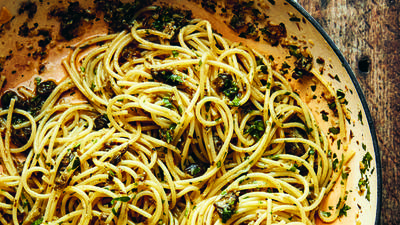
When people try to sell us on the five-a-day mantra, they say, "Look at vegetables with new eyes. See their endless possibilities." Rebecca Rupp did just that. She is a science and nature writer, and her look at the vegetable aisle produced not recipes, but stories. The intriguing, wacky and mythical sides of vegetables are chronicled in How Carrots Won the Trojan War: Curious (but True) Stories of Common Vegetables.
LRK: How did carrots win the Trojan War?
 Rebecca Rupp
Rebecca Rupp
RR: Carrots are one of those horseshoe nail stories -- little things that had big effects. The story goes that when the Greeks were penned up inside their Trojan horse, they ate carrots "to bind their bowels," presumably eliminating the need for bathroom breaks. This allowed them to lie low long enough to be dragged into the city, ambush the populous and win the war.
This is interesting considering the Greeks' alternative use for carrots as aphrodisiacs. Supposedly the Greek soldiers plied their female captives with carrots to break down their inhibitions. It seems an odd mix.
LRK: It really does. I don't really want to know about what went on in that Trojan horse while they were waiting to attack.
RR: Practically anything even remotely cylindrical in the garden was an aphrodisiac except cucumbers.
LRK: Why not cucumbers?
RR: Apparently their reputation was cooling, so cucumbers and lettuce were supposed to damp down sexual ardor.
LRK: Is there any truth to the business about carrots helping night vision?
RR: Actually there is. Carrots are a great source of vitamin A, which is a precursor of a visual pigment called rhodopsin. One of the first signs of a lack of vitamin A is you tend to lose night vision.
 How Carrots Won the Trojan War
How Carrots Won the Trojan War
LRK: The pilots in World War II were told to eat carrots?
RR: They didn't exactly, but I love the story. The British Air Force had acquired radar at one point in World War II but they didn't want the Germans to know. There was one particularly superb pilot whose nickname was Cat's Eyes Cunningham who was known for his expertise in shooting down German planes using the new radar technique.
Hoping to distract the Germans from all the radar towers that were now bristling along the British coast, they put out this rumor that Cunningham and his fellow pilots were being fed this prodigious diet of carrots, which allowed them to see in the dark. It's not clear this fooled the Germans, but it was really picked up by the British public, who started eating a lot of carrots in hopes that it would help them navigate in the blackout.
LRK: Switching gears to some other things we see all the time in the vegetable aisle, how about lettuce? Why is money often referred to as lettuce?
RR: Money became green during the Civil War under Abraham Lincoln, who printed the first green banknotes. The Union Army was paid with them and they called them greenbacks. They stayed in circulation forever, and eventually money picked up a whole bunch of green-related names. Around the turn of the century it was called kale, in the 1920s green money was called lettuce, in the 1940s it was called cabbage. I love this.
Then the Confederate money, which was either gray or blue, was called shucks from corn shucks or corn husks, because it was essentially worthless.
LRK: There is something in the book -- corn creates vampires?
RR: Well, there's a theory. Corn isn't a complete protein source, it lacks a couple of essential amino acids, and it doesn't have much of anything in the way of niacin, which is vitamin B3. A diet that's really, really heavy in corn can lead to a vitamin deficiency disease called pellagra, which was a real problem in the American South in the late 1800s and beginning of the 20th century.
Pellagra came to Europe neck-and-neck with when people started eating American corn. Sufferers from pellagra were first called the butterfly people because they'd have this butterfly-shaped rash on their face. But as the disease progressed, the symptoms included sun sensitivity, dementia and a slow-wasting death. It was really an awful disease.
All these thin, pale, peculiar, light-avoiding people -- a couple of researchers in the Journal of the Royal Society of Medicine in Britain postulated -- were the source of vampire legends. They sounded a lot like vampires. One theory is that maybe Dracula just needed a dose of vitamin B3 and he might have been fine.
LRK: And lay off corn on the cob.
RR: No kidding. South Carolina at one point even put corn on trial on a charge of murder.
LRK: Really? When was that?
RR: Right at the beginning of the 20th century, around 1905 or so. They didn't know how to treat pellagra or what it was -- obviously you had to blame someone.
LRK: If only people ate the beans with the corn, everything would have been fine.
Before you go...
Each week, The Splendid Table brings you stories that expand your world view, inspire you to try something new, and show how food connects us all. We rely on your generous support. For as little as $5 a month, you can have a lasting impact on The Splendid Table. And, when you donate, you’ll join a community of like-minded individuals who love good food, good conversation, and kitchen companionship. Show your love for The Splendid Table with a gift today.
Thank you for your support.
Donate today for as little as $5.00 a month. Your gift only takes a few minutes and has a lasting impact on The Splendid Table and you'll be welcomed into The Splendid Table Co-op.




